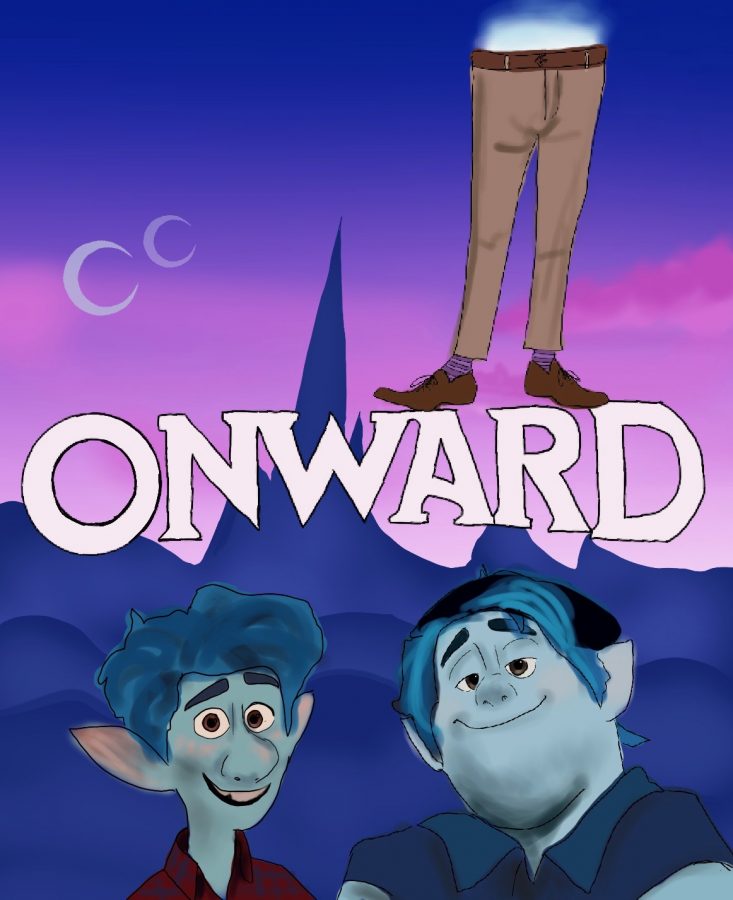“Onward” Proves That Pixar’s Worst is Still Worthwhile
“Onward” is Disney’s newest movie.
April 24, 2020
Rating: 3.5/5 Falcons
In 2019, Disney proved its ability in getting people to buy movie tickets—it drew in over 10 billion dollars in box-office revenue. Last year, Disney released the final installments of the Avengers and Star Wars franchises, sequels to Frozen and Toy Story, and remakes of The Lion King and Aladdin—all of which each grossed over 1 billion dollars worldwide. This is why it was unpredictable that Onward, Disney’s first theatrical release of 2020, would be a box-office flop. Onward, Pixar’s first standalone movie since 2017’s Coco, was released amid the coronavirus shutdown of 2020, which caused a commercial misfire—the film drew a box-office total of 100 million against a budget of 200 million dollars.
Directed by Dan Scanlon, the mind behind Monsters University, Onward plays with the same idea of mythical creatures leading human lives. Set in a fantasy world where magic was formerly used in everyday life but has ultimately been forgotten, Onward introduces us to Ian (voiced by Tom Holland), an awkward high-schooler, and Barley (voiced by Chris Pratt), Ian’s overly-confident older brother.
The movie opens on Ian’s 16th birthday, showing Ian doing customary 16-year-old tasks—attempting to make new friends, earning his driver’s license—that end up going poorly. Ian’s circumstances shift when his mother gives him a gift from his father, who died shortly before his birth. The gift is a magical staff, a gem, and a visitation spell that would allow Ian to meet his father for a single day. In the first memorable scene of the movie, Ian succeeds in casting the spell, but the gem disintegrates before completing the spell and only the bottom half of his father appears. The premise of the film then becomes the brothers’ quest to find another gem to finish the spell and meet their father.
At first glance, Onward feels easily dismissable and very formulaic in terms of Disney tropes. Conceptually, it’s boring; materially, it offers nothing new, leaning more on its predecessors than attempting its own originality. It’s standard at this point for a Disney protagonist to have a dead parent. For Pixar’s standards, Onward is an average movie, with thin plot lines and uncompelling side characters. Onward doesn’t have the originality of Inside Out or the nostalgic touch of Up, both films hailed as Pixar masterpieces. The film never steps out of its comfort zone and its character development arcs are barely fleshed out by the end. But it’s the heart of Onward, with a strong family message and a positive representation of brotherly love, that wins viewers over. Even through its predictable plot points, the chemistry between Holland’s and Pratt’s characters ultimately pull the movie together.
Spoilers aside, one of the most beautiful moments in Onward is towards the film’s conclusion, when one of the brothers makes a subtle sacrifice for the other that overtly breaks viewers’ hearts. This scene indicates that Pixar’s lowest standard is another studio’s gold.
In response to Onward’s poor box-office returns, Disney released the movie to streaming platforms ahead of time, scheduling a Disney+ release just three weeks after its theatrical debut. If your family is looking for something to do during quarantine and self-isolation, I recommend sitting down to watch this movie. If you get past its tropes and cliches, there is definitely a worthwhile narrative about two brothers underneath.









